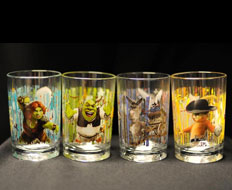An anonymous tip to a California congresswoman led to the discovery that the paint on McDonald’s USA’s new Shrek promotional glassware contained the metal cadmium.
On June 4 the company recalled all 12 million Shrek-themed glasses, which it called an “abundance of caution” because the paint on the glasses contained only slightly more cadmium, a known carcinogen, than is safe for humans to consume.
"As always, the safety and well-being of our customers is a top priority and would never be knowingly compromised,” said William Whitman Jr., vice president of communications for McDonald's USA, in a statement.
Five days after the recall, in a strategy seldom, if ever, used in corporate America all U.S. McDonald’s locations began paying $3 to consumers who returned the glasses—more than they were originally sold for. When they were released in mid-May, the glasses sold for $1.99 with a food purchase, and $2.49 without.
In an interview with QSR, Danya Proud, spokeswoman for McDonald’s USA, says the company decided to pay back a premium on the glasses because it is accounting for any taxes that were added to the purchase.
“Rather than dealing with state-by-state taxes, we determined that the $3 would cover everything,” she says, withholding how much money the company would lose in the process.
“For us it was about making sure that we satisfied our customers and made sure that we made it as easy operationally as possible for our restaurants, given that we’ve got 14,000 locations.”
McDonald’s initiated the recall of the Shrek glasses after the U.S. Consumer Product Safety Commission (CPSC) alerted it of the cadmium problem.
Patty Davis, spokesperson for the CPSC, says the organization was informed of the problem with the glassware a week before McDonald’s announcement. The information came from Jackie Speier, a U.S. Congressional representative from California who learned of the problem from an anonymous constituent.
“We immediately secured samples,” Davis says. “We sent them for testing to our laboratory that’s right here in Maryland … and we did a variety of testing in our own laboratory.
“We contacted McDonald’s with the results, and McDonald’s did the right thing. They worked closely with us.”
Davis says the CPSC has scientists working to establish the level of cadmium that is unsafe for human consumption, and that the Shrek glasses have slightly more than “the level that we are currently working on.”
Whitman said in the McDonald’s release that the company was “in compliance with all applicable federal and state requirements at the time of manufacture and distribution,” but that it would respect the caution of the CPSC by initiating the recall.
“McDonald’s safety standards are among the highest in the industry and the company has a strong track record,” Whitman said. “McDonald's has a longstanding, cooperative relationship with the CPSC, and continues to follow their lead as testing protocols and new scientific information becomes available."
The fact that McDonald’s Shrek glasses were in compliance with federal regulations at the time of manufacture and distribution didn’t stop Congress from taking further action with the company.
Rep. Henry Waxman, another U.S. Congressional representative from California, sent a letter to McDonald’s on behalf of the Committee on Energy and Commerce, which he chairs, requesting that “McDonald's Corp. officials brief the Committee staff on the company's policies to ensure the safety of products it sells in its restaurants.”
The Committee also requested, among other things, that McDonald’s provide documents related to the testing of the Shrek glasses; a list of companies that McDonald’s uses to manufacture products for children; and a description of the company’s relationship with ARC International, the New Jersey company that produced the Shrek glasses.
On her website, Speier—who is not a member of the Committee on Energy and Commerce—posted a statement that stressed the need for product safety for children.
“Although McDonald’s did the right thing by recalling these products, we need stronger testing standards to ensure that all children’s products are proven safe before they hit the shelves," she said. “Cadmium is a toxic substance that is extremely dangerous to the developmental health of children.”
John Weber, president of Dezenhall Resources, a crisis-management and communication firm, says McDonald’s biggest challenge after the recall is protecting itself from Congress.
“It’s part of a huge increase in Congress’ attention to how business is conducted,” Weber says. “They want to dig into understanding the processes and mechanics of how some of these products come to market.”
Weber says McDonald’s handled itself perfectly while maneuvering through the recall episode, taking responsibility even though the cadmium inclusion was not directly the company’s fault.
“I think they did the right thing, they did it quickly, they worked cooperatively, and they minimized investigational liability,” he says. “Today, whoever owns the brand owns the crisis. While McDonald’s may not have been directly associated with the cadmium in the paint, the fact that they’ve got the biggest brain makes this problem their problem. Companies today are increasingly responsible for their supply chain.”
The fact that the recall of the Shrek glasses was so newsworthy, Weber says, is simply because McDonald’s is such a large chain; if it happened to a smaller quick serve, chances are it wouldn’t have made such a splash.
The size of McDonald’s is also the reason why Weber says the company won’t suffer from any consumer backlash.
“I would imagine with a mammoth, multibillion-dollar enterprise like McDonald’s, I don’t want to say this is inconsequential, but they’re far more worried about their reputation at this point than the impact of this on their bottom line,” he says.

